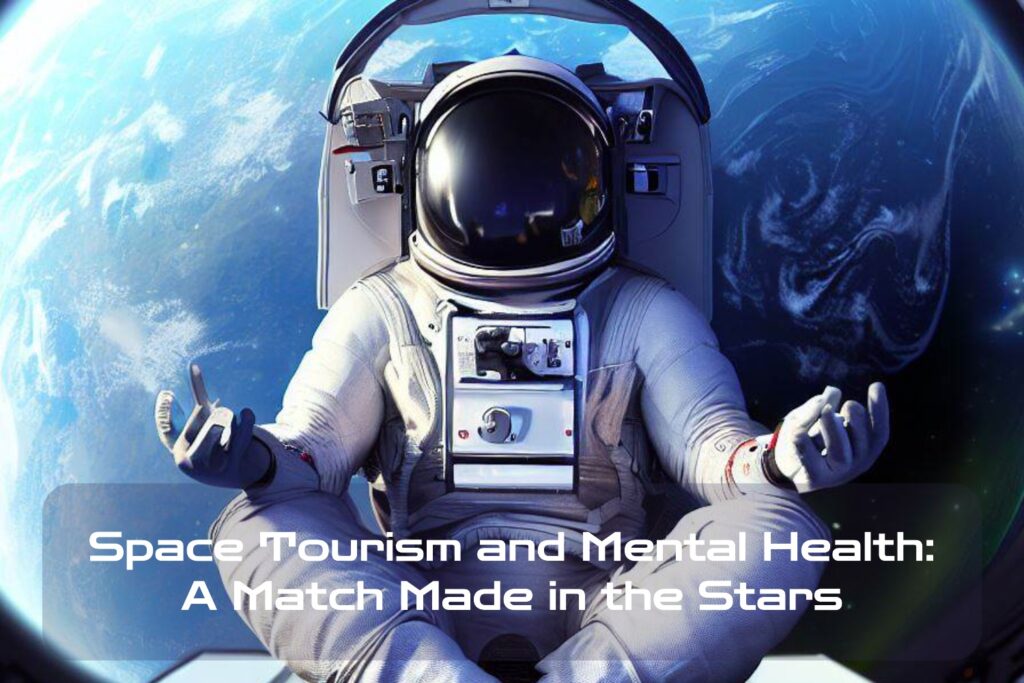Space tourism has long been a topic of interest among those seeking adventure, novelty, and new frontiers to explore. However, what many people don’t realize is that space travel also holds tremendous potential for promoting mental health and wellness. There are many reasons why space tourism can be beneficial for mental health, including the unique perspective that viewing Earth from space offers and the absence of daily distractions found on our planet.

For starters, the view from space is awe-inspiring, offering a unique perspective on our place in the universe. Being able to see the curvature of Earth and the vast expanse of stars around us can help put things into perspective and promote feelings of interconnectedness with all living things.
Moreover, it offers an opportunity for mindfulness – being present in the moment – as travelers take in this once-in-a-lifetime experience. Another benefit of space tourism is that it offers an opportunity to disconnect from everyday distractions.
In today’s world, we are constantly bombarded with notifications, social media updates, and other stimuli that can take a toll on our mental well-being. By contrast, space travellers are essentially “off the grid” during their journey; they have no access to phone calls or emails and won’t receive any interruptions from daily life.
Raising Awareness About Space Tourism’s Benefits for Mental Health

While much has been written about the physical benefits that space travel can offer (such as scientific research opportunities or technological advancements), less attention has been paid to its psychological benefits.
By highlighting some key ways in which space travel could benefit mental health – such as through perspective-taking, mindfulness, and disconnection from daily distractions – we hope to raise awareness about the potential of space tourism as a tool for promoting holistic well-being. Furthermore, by discussing some of the challenges that need to be addressed in order to make space tourism more accessible for all potential travelers, we aim to encourage discussion around how best to realize this vision.
Benefits of Space Tourism for Mental Health
An Escape from the Mundane
One of the benefits of space tourism is the opportunity to escape from the mundane routines of everyday life. Being able to step out of one’s daily environment and experience something new and exciting can be a refreshing change. This break can allow us to disconnect ourselves from work, personal problems, and other stresses that may be contributing to our mental health issues.
The Unique Environment of Space

In addition to providing an escape from daily life, space tourism also offers a unique environment that can positively impact mental health. The view of Earth from space is said to have a profound effect on those who experience it.
Astronauts have reported feeling more connected with humanity and gaining a renewed sense of purpose after seeing our planet from above. The environment in space also offers an opportunity for relaxation, mindfulness, and perspective-taking.
The lack of gravity provides a sensation that is difficult to replicate on Earth while allowing our minds and bodies to feel weightless. This sensation allows for greater focus on breathing techniques or meditation practices without the distractions often found in everyday life.
Opportunities for Personal Growth
Space tourism also has the potential to promote personal growth. Engaging in activities such as learning about spacecraft systems or participating in experiments can help individuals build self-confidence, resilience, and problem-solving skills. Additionally, facing the challenges associated with travel into space can serve as an opportunity for self-discovery by pushing oneself outside their comfort zone.
Overall, space tourism has several unique benefits that differentiate it from other forms of travel or therapy when considering improving mental health and well-being. The opportunity to escape daily routines, being immersed in a unique environment, and have opportunities for personal growth make it an appealing option worth exploring further.
Space Tourism Activities that Promote Mental Health

The Benefits of Mindful Practices in Space
Space tourism is not just about experiencing weightlessness or seeing the Earth from a different perspective. Space travel can offer a unique opportunity for individuals to engage in activities that promote mental health and well-being. One of the most popular activities is mindfulness practice, such as meditation and yoga.
These practices are known to have several benefits for mental health, including reducing stress, anxiety, and depression. Meditation involves focusing one’s attention on a specific thought or activity to calm the mind and improve awareness.
In space, meditation can be particularly effective because there are fewer distractions than on Earth. Astronauts can meditate while looking out at the vast expanse of space or simply close their eyes and focus their thoughts inwardly.
This practice has been shown to reduce stress levels, improve sleep quality, and enhance overall well-being. Similarly, yoga offers several benefits for mental health by promoting relaxation, improving flexibility and balance, and reducing stress levels.
The practice involves holding various postures while focusing on breath control techniques. In space, where the body experiences weightlessness, yoga poses can be even more beneficial as they require less effort to hold without gravity’s pull.
The Wonders of Stargazing in Space

Another activity that promotes mental health during space tourism trips is stargazing. The view of the stars from outer space is like no other view on Earth – it is simply breathtaking! Stargazing offers a momentary escape from life’s worries as one gets lost in one’s thoughts amid the infinite expanse of stars.
Moreover, viewing celestial bodies with telescopes provides opportunities for reflection and self-examination. Astronauts may find themselves contemplating some of life’s big questions as they observe celestial objects such as black holes or distant galaxies; this experience could lead them to develop a new appreciation for their place in the universe.
Challenges to Overcome in Using Space Tourism for Mental Health Promotion
The Cost Barrier

One of the main challenges of using space tourism as a tool for promoting mental health is the cost barrier. Space travel is still relatively new and expensive, making it an exclusive experience that only the wealthy can afford. The average cost of a suborbital spaceflight, which lasts about 15 minutes, is currently around $250,000.
This leaves many people who could potentially benefit from a space tourism trip unable to access it.
However, there are ways to overcome this challenge.
One way is through government funding or sponsorships from private entities that recognize the potential benefits of space tourism for mental health promotion. Additionally, as the industry continues to grow and develop, it’s possible that costs will decrease and become more accessible to a wider range of people.
Accessibility Issues

Another challenge facing the use of space tourism for mental health promotion is accessibility issues. Currently, there are only a few companies offering commercial space flights, and they are primarily located in the United States.
This means that individuals from other parts of the world may face additional barriers, such as visa requirements or travel restrictions. To overcome these challenges, companies can work on expanding their offerings to other countries or partnering with existing international travel companies to provide more accessible options for interested individuals.
Safety Concerns

Space travel also comes with inherent risks associated with leaving Earth’s atmosphere and entering an unfamiliar environment. Safety concerns must be addressed thoroughly prior to any commercial flights taking place. This challenge can be mitigated through careful planning and preparation by companies offering space tourism experiences.
They must ensure that all necessary safety measures are in place and properly communicated to participants before embarking on any trips. In addition, governments can impose regulations and guidelines on commercial spaceflight operators to ensure that all safety protocols are followed.
Overall, while there may be challenges to overcome in using space tourism as a tool for promoting mental health, these obstacles are not insurmountable. With careful planning and cooperation between private companies and government organizations, the potential benefits of space travel for mental health promotion can be realized by a wider range of people.
Case Studies: Examples of Successful Space Tourism Trips for Mental Health Promotion
The Overview
Now that we’ve discussed how space tourism can be used to promote mental health, let’s take a look at some real-life examples where this has been successfully done. There have been a few space tourism trips that have explicitly focused on promoting mental well-being, and they have resulted in some positive outcomes. These trips were meticulously planned and executed with the goal of catering to the mental health needs of their passengers.
The Virgin Galactic Experience
One example is the Virgin Galactic experience, where participants were offered specific activities aimed at promoting mindfulness and relaxation. For example, during their flight, they were given time to float in zero gravity while listening to calming music.
Participants also had access to virtual reality headsets that displayed peaceful scenes from Earth as well as space. The purpose of these experiences was to allow passengers to disconnect from everyday stresses and improve their overall well-being.
The success of these activities was evident when participants reported feeling more relaxed and mindful after the trip. Many participants also reported feeling a sense of awe when seeing Earth from above and reflecting on how small our problems really are in the grand scheme of things.
The Axiom Space Mission
Another example is the Axiom Space mission, which has been designed with mental health promotion in mind. This mission had four participants who spent 10 days together aboard the International Space Station (ISS).
During their time there, they engaged in activities like meditation, yoga, and group therapy sessions. What makes this mission unique is that it emphasizes social connection as a key factor in promoting mental health.
The four participants went through training together before launch day so that they could build relationships with each other beforehand. By prioritizing social connection within an isolated environment like space, this mission hopes to improve participants’ mental health by fostering a sense of community.
The Orbital Assembly Mission

The Orbital Assembly mission, is a project that aims to build a space station that can accommodate tourists. While this project is still in its early stages, it has been designed with mental health promotion as one of its primary goals.
The space station will be designed to provide passengers with ample opportunities for relaxation, mindfulness, and personal growth. The space station will have features like artificial gardens and virtual reality spaces designed for meditation and yoga.
Additionally, passengers will be able to engage in activities like stargazing and spacewalks while receiving guidance from trained professionals. By providing passengers with these experiences, the Orbital Assembly mission hopes to improve their overall well-being while creating new opportunities for exploration beyond Earth.
Future Implications: The Role of Space Tourism in Promoting Mental Health

The Potential for Growth in Space Tourism
As space tourism continues to develop and expand, there is great potential for it to become a more accessible and affordable option for individuals seeking mental health benefits. With advancements in technology and infrastructure, space tourism could become a more mainstream option for those interested in promoting their mental health and well-being. As the industry grows, we may see an increase in research on the benefits of space travel on mental health, which could further promote the use of space tourism as a tool for mental health promotion.
Implications for Space Exploration and Mental Health Research
Beyond its potential as a standalone tool for promoting mental health, the use of space tourism may also have implications for broader research on the relationship between space exploration and mental health. By studying how individuals respond psychologically to space travel, researchers can gain insights into how we can better support astronauts during longer missions or even prepare them better before they depart. This research may also have applications outside of just astronauts – findings from studies with tourists could potentially be applied to help people on Earth.
Final Thoughts

Overall, while still nascent, there is much excitement around the potential role that space tourism has to play in promoting mental health and well-being.
While questions remain around access and affordability, early indications suggest that experiences like floating weightlessly among stars or taking part in mindfulness exercises while orbiting our planet hold great promise when it comes to supporting psychological wellness.
Looking ahead as this industry continues to evolve – both through commercial enterprises like SpaceX’s planned trips around the moon or through government-led programs like NASA’s Artemis program aimed at returning humans to lunar surfaces by 2024 – we expect that opportunities will abound not only for setting foot where no one has gone before but also for achieving greater inner peace and meaning in life.

C M, a seasoned editor, journalist, and consultant, is deeply fascinated by the convergence of technology, space, and the future of humanity.
With a particular interest in transhumanity, futurology, and the philosophical and ethical dimensions of these domains, C M serves as the lead contributor to SpaceSpotlight and TranscendSphere.
When not penning insightful articles on these rapidly evolving fields, C M indulges in their love for podcasts and books, proudly embracing their status as a ‘Happy Nerd Extraordinaire!’



